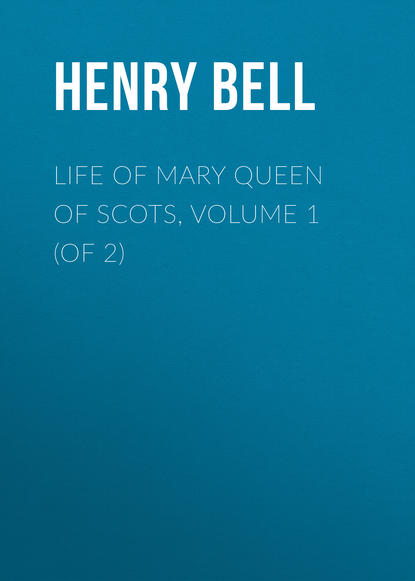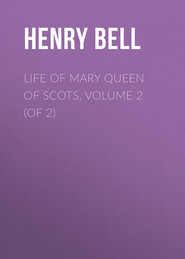По всем вопросам обращайтесь на: info@litportal.ru
(©) 2003-2024.
✖
Life of Mary Queen of Scots, Volume 1 (of 2)
Настройки чтения
Размер шрифта
Высота строк
Поля
Keith, p. 165, et seq.
30
Keith, p. 167, et seq.
31
Robertson says, that the amendment would not have been approved of by “either Queen.” He alleges that Mary had only “suspended” the prosecution of her title to the English Crown; and that “she determined to revive her claim, on the first prospect of success.” That Robertson has, in this instance, done injustice to Mary, is evident, from the exact consistency of her future conduct, with what will be found stated in the text. —Robertson, Vol. ii. p. 200.
32
Keith, p. 170. et seq. Robertson says, that at the period of these conferences, Mary was only in her eighteenth year; but, as they both took place in 1561, she must have been in her nineteenth year, which Keith confirms, who says (page 178), “The readers having now perused several original conferences, will, I suppose, clearly discern the fine spirit and genius of that princess, who was yet but in the 19th year of her age.”
33
Brantome in Jebb, vol. ii. p. 82.
34
Keith, p. 175. Throckmorton writes, “Thereto the Queen-mother said, The King, my son, and I, would be glad to do good betwixt the Queen, my sister, your mistress, and the Queen, my daughter, and shall be glad to hear that there were good amity betwixt them; for neither the King, my son, nor I, nor any of his Council, will do harm in the matter, or show ourselves other than friends to them both.”
35
Keith, p. 164.
36
Keith, Appendix, p. 92.
37
Robertson, Appendix, No. 5. – from the Cotton Library.
38
Keith, p. 178. – Chalmers, vol. ii. p. 418 – Stranguage, p. 9 – and Freebairn, p. 19.
39
Brantome in Jebb, vol. ii. p. 483, et seq. – Keith, p. 179 – and Freebairn, p. 16 et seq.
40
Several translations of this song have been attempted, but no translation can preserve the spirit of the original.
Adieu, thou pleasant land of France!
The dearest of all lands to me,
Where life was like a joyful dance —
The joyful dance of infancy.
Farewell my childhood’s laughing wiles,
Farewell the joys of youth’s bright day;
The bark that bears me from thy smiles,
Bears but my meaner half away.
The best is thine; – my changeless heart
Is given, beloved France! to thee;
And let it sometimes, though we part,
Remind thee with a sigh of me.
Mary was not the only one who commemorated in verse her departure from France. Numerous Vaudevilles were written upon the occasion, several of which are preserved in the Anthologie Française.
41
Jebb, vol. ii. p. 484. Keith, p. 180. Miss Benger, vol. ii. p. 125. In an anonymous French work, entitled, “Histoire de Marie Stuart, Reine d’Ecosse et de France,” &c. respectably written on the whole, there is an amusing mistake concerning the locality of Holyroodhouse. In tom. i. p. 181, it is said, “The Queen landed at Leith, and then departed for L’Islebourg,” (the name anciently given to Edinburgh), “a celebrated Abbey a mile or two distant. In this Abbey Mary remained for three weeks, and in the month of October 1561 took her departure for Edinburgh.” This departure for Edinburgh alludes to the visit which Mary paid, a short time after her arrival, to the Castle.
42
The day that his present Majesty George IV. arrived at Leith, in August 1822 (whose landing and progress to Holyroodhouse, though much more brilliant, resembled in some respects that of his ancestor Mary), was as wet and unfavourable as the weather so piously described by Knox. Was this a “forewarning” also of the “comfort” our gracious Sovereign brought into the country? If Knox believed in warnings, there is no telling to what conclusions these warnings might have led.
43
M’Crie’s Life of Knox, vol. ii. p. 22.
44
Miss Benger (vol. ii. p. 132) erroneously supposes, that the Archbishop of St Andrews had died before Mary’s return to Scotland. She should have known that it was he who presided at the baptism of James VI., of which ceremony she gives so particular an account. See Keith, p. 360, and Chalmers, vol. i. p. 196.
45
Jebb, vol. ii. p. 486. Chalmers, vol. ii. p. 202.
46
Buchanan’s Detection, in Anderson’s Collections, vol. ii. p. 52 and 58.
47
This is apparently the first time Mary had ever expressed to Knox her sentiments regarding this pamphlet. He had been treated less ceremoniously by Elizabeth. But knowing the respect in which she was held by the Protestants, he saw it for his interest to attempt to pacify her, and wrote to her several conciliatory letters. Elizabeth put a stop to them, by desiring Cecil, to forward to Knox the following laconic epistle, which merits preservation as a literary curiosity: – “Mr Knox! Mr Knox! Mr Knox! there is neither male nor female: all are one in Christ, saith Paul. Blessed is the man who confides in the Lord! I need to wish you no more prudence than God’s grace; whereof God send you plenty. W. Cecil.” Chalmers, vol. ii. p. 494. Knox himself gives a somewhat different edition of this letter, (Hist. of the Reformation, p. 212.) Where Chalmers found the above, he does not mention.
48
Knox’s History of the Reformation, p. 287, & seq. – Keith, p. 188. It is worth observing, that Knox is the only person who gives us any detailed account of these interviews, and he, of course, represents them in as favourable a light for himself as possible. “The report,” says Randolph, “that Knox hath talked with the Queen, maketh the Papists doubt what will become of the world.” – “I have been the more minute in the narrative of this curious conference,” says M’Crie, “because it affords the most satisfactory refutation of the charge that Knox treated Mary with rudeness and disrespect.” Different people have surely different modes of defining rudeness and respect.
49
Keith supposes erroneously, that this disturbance took place in the Chapel at Holyrood. Randolph, his authority, though his expressions are equivocal, undoubtedly alludes to the Royal Chapel at Stirling. Keith, p. 189 and 190.






